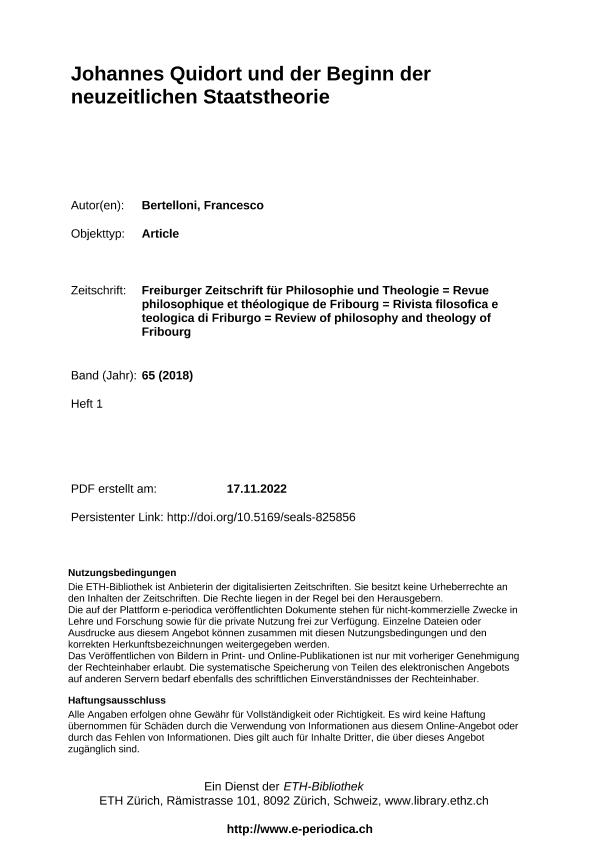Mostrar el registro sencillo del ítem
dc.contributor.author
Bertelloni, Carlos Francisco

dc.date.available
2022-11-18T19:04:30Z
dc.date.issued
2018-11
dc.identifier.citation
Bertelloni, Carlos Francisco; Johannes Quidort und der Beginn der neuzeitlichen Staatstheorie; Instituto Federal Suizo de Tecnología de Zúrich; Freiburger Zeitschrift für Philosophie und Theologie; 65; 1; 11-2018; 155-172
dc.identifier.issn
0016-0725
dc.identifier.uri
http://hdl.handle.net/11336/178387
dc.description.abstract
Der Traktat De potestate regia et papali von Johannes Quidort zeigt, dass sich hinter seiner Antwort auf die Frage nach dem Verhältnis von geistlicher und weltlicher Gewalt die Anwendung von philosophischen Begriffen und Kausalitätsmodellen verbirgt. Dadurch gelingt es dem französischen Dominikanertheologen eine politische Ordnung als säkulare Gesellschaft zu konstruieren, die auf eine arbeitende Eigentümerbourgeoisie gründet und das Recht hat, ihren Leiter zu wählen. Für Quidort zeigt sich das Politische im Leben des Menschen als Ergebnis des materiellen Werdens seines alltäglichen Lebens und des Antagonismus von Gesellschaftlichkeit und Besitz, d.h. zweier Naturtriebe, die obgleich beide durch Gott gegeben sind, sich beide in permanenter Opposition finden, bis die königliche iurisdictio eine „politische Ordnung" schafft.
dc.description.abstract
In his De potestate regia et papali, John Quidort uses philosophical concepts and causality models to explain the relationship between spiritual and secular powers. In this way, the French Dominican theologian succeeds in theorizing a political order as a secular society based on a bourgeoisie that has the right to choose their own king. For Quidort, political life appears, on the one hand, as the result of the material conditions of life, and, on the other hand, because of the antagonism between sociability and possession. Though both sociability and possession are natural instincts given by God, they are nevertheless in permanent opposition until a "political order" is created by the king.
dc.format
application/pdf
dc.language.iso
deu
dc.publisher
Instituto Federal Suizo de Tecnología de Zúrich
dc.rights
info:eu-repo/semantics/openAccess
dc.rights.uri
https://creativecommons.org/licenses/by-nc-sa/2.5/ar/
dc.subject
Juan Quidort
dc.subject
teoría política medieval
dc.subject
teoría política moderna
dc.subject.classification
Otras Filosofía, Étnica y Religión

dc.subject.classification
Filosofía, Ética y Religión

dc.subject.classification
HUMANIDADES

dc.title
Johannes Quidort und der Beginn der neuzeitlichen Staatstheorie
dc.type
info:eu-repo/semantics/article
dc.type
info:ar-repo/semantics/artículo
dc.type
info:eu-repo/semantics/publishedVersion
dc.date.updated
2022-11-16T11:39:53Z
dc.identifier.eissn
2624-6775
dc.journal.volume
65
dc.journal.number
1
dc.journal.pagination
155-172
dc.journal.pais
Suiza
dc.journal.ciudad
Zurich
dc.description.fil
Fil: Bertelloni, Carlos Francisco. Universidad de Buenos Aires. Facultad de Filosofía y Letras. Centro de Estudios de Filosofía Medieval; Argentina. Consejo Nacional de Investigaciones Científicas y Técnicas; Argentina
dc.journal.title
Freiburger Zeitschrift für Philosophie und Theologie
dc.relation.alternativeid
info:eu-repo/semantics/altIdentifier/url/https://www.e-periodica.ch/digbib/view?pid=fzp-003:2018:65::579#165
dc.relation.alternativeid
info:eu-repo/semantics/altIdentifier/doi/http://doi.org/10.5169/seals-825856
Archivos asociados
